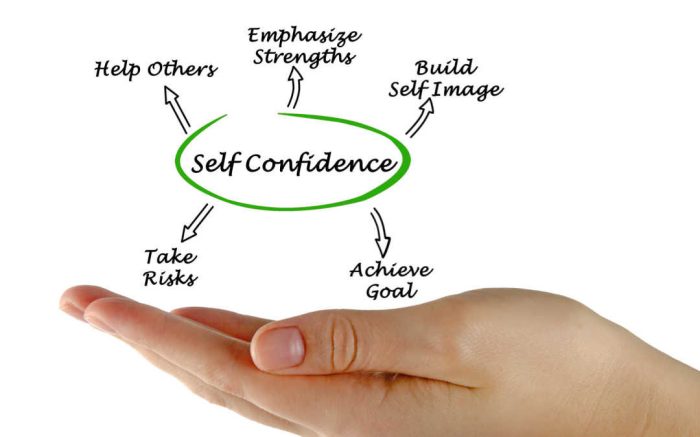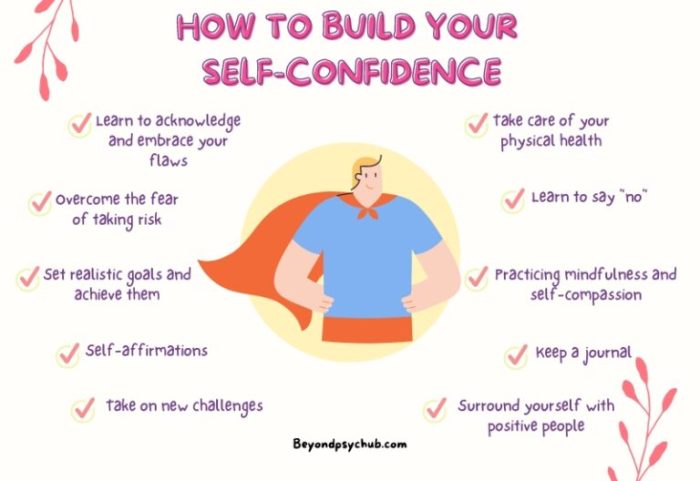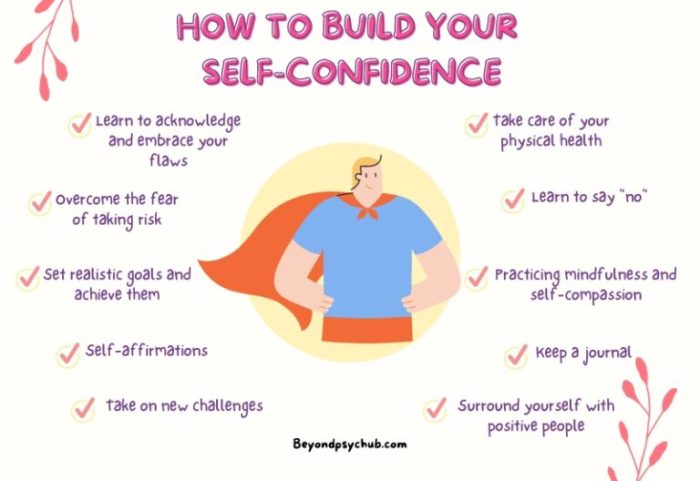Building Self-Confidence, let’s dive into how to own your self-esteem and rock your confidence like a boss.
Unleash your inner potential and conquer your doubts with these practical strategies and tips.
Understanding Self-Confidence

Self-confidence is the belief in oneself and one’s abilities to achieve success. It is about trusting your own judgment and feeling secure in your decisions.
Impact on Various Aspects of Life
- Academic Performance: Students with high self-confidence are more likely to take on challenges, seek help when needed, and persist in the face of setbacks.
- Relationships: Self-confident individuals are better at communication, setting boundaries, and maintaining healthy relationships.
- Career Success: Confidence can lead to better job performance, increased leadership opportunities, and higher levels of job satisfaction.
- Mental Health: Self-confidence is linked to lower levels of anxiety, stress, and depression.
Difference Between Self-Esteem and Self-Confidence
Self-esteem refers to a person’s overall sense of self-worth and value, while self-confidence specifically relates to belief in one’s abilities. You can have high self-esteem but low self-confidence, or vice versa. Building both is important for a balanced sense of self.
Factors Influencing Self-Confidence
Building self-confidence is influenced by a combination of internal and external factors, as well as past experiences that shape our beliefs and perceptions about ourselves.
Internal Factors
- Self-awareness: Understanding our strengths, weaknesses, and values can help boost self-confidence.
- Positive mindset: Cultivating a positive attitude towards oneself and one’s abilities can enhance self-confidence.
- Resilience: Being able to bounce back from failures and setbacks can strengthen self-confidence over time.
- Self-acceptance: Embracing oneself, flaws and all, is essential for building authentic self-confidence.
External Factors
- Social support: Having a supportive network of friends, family, and mentors can positively impact self-confidence.
- Feedback: Constructive feedback and encouragement from others can help boost self-confidence and provide validation.
- Media Influence: Images and messages portrayed in media can impact self-esteem and self-image, influencing self-confidence levels.
- Successes and achievements: External recognition of one’s accomplishments can contribute to a sense of self-worth and confidence.
Role of Past Experiences
Past experiences, both positive and negative, play a significant role in shaping self-confidence. Traumatic events or repeated failures can lower self-esteem and confidence, while past successes and positive feedback can bolster self-confidence. It is important to reflect on past experiences, learn from them, and use them as stepping stones towards building a stronger sense of self-confidence.
Strategies for Building Self-Confidence
Building self-confidence is key to success and happiness in life. Here, we will discuss practical tips to boost your self-confidence, the importance of setting achievable goals, and the benefits of positive self-talk.
Setting Achievable Goals, Building Self-Confidence
Setting achievable goals is crucial for enhancing self-confidence. When you set realistic and attainable goals, you create a sense of accomplishment that boosts your confidence. Start by breaking down your larger goals into smaller, manageable steps. Celebrate each small victory along the way to keep yourself motivated.
Positive Self-Talk
Positive self-talk involves encouraging and affirming yourself instead of putting yourself down. Replace negative thoughts with positive affirmations. Remind yourself of your strengths, capabilities, and past successes. By practicing positive self-talk, you can cultivate a more optimistic mindset and improve your overall self-confidence.
Overcoming Self-Doubt

Self-doubt can be a major obstacle to building self-confidence, but there are strategies to help overcome it and cultivate a positive self-image.
Impact of Comparison on Self-Confidence
Comparison to others can greatly impact self-confidence, leading to feelings of inadequacy and insecurity. Combat this by focusing on your own achievements and progress, rather than constantly comparing yourself to others. Remember, everyone has their own unique journey and strengths.
Reframing Negative Thoughts
To build self-confidence, it’s important to reframe negative thoughts into more positive and constructive ones. Instead of dwelling on failures or mistakes, see them as learning opportunities for growth. Practice self-compassion and remind yourself of your strengths and accomplishments. Surround yourself with supportive and positive influences to help reinforce these positive thoughts.
